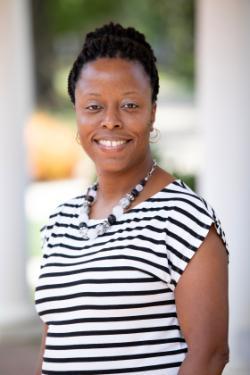
Dr. Marsha Rutledge
Dr. Marsha Rutledge
Highlights Diversity, Equity and Inclusion in Longwood’s Counselor Education Program
Dr. Marsha Rutledge, assistant professor in Longwood’s Counselor Education, M.S. program, loves training future counselors and knows that the opportunities for multiple field placements and flexible course progressions make Longwood's counselor education program unique. 
“My main goal is to teach students about the importance of culture and how critical it is to the counseling relationship and process,” Rutledge said. “We approach all school-related information from a culturally conscious and responsive perspective.”
She brings 18 years of real-world clinical experience to the program and said that a solid foundation in mental health and school counseling begins with cultural competence. With a focus on education in diversity, equity, and inclusion, along with multicultural and social justice perspectives, Rutledge mentors and teaches Longwood students how to advocate and recognize opportunities; and access issues for underrepresented populations.
Rutledge extends her advocacy for diversity and inclusion through active participation in the Virginia School Counselor Association (VSCA) and the American School Counselor Association (ASCA). She chairs ASCA’s Anti-Racism Committee and serves on its Diversity, Equity and Inclusion Committee.
“School systems aren’t exempt from issues related to racism and oppression, Rutledge said. My responsibility in this work is to support future school counselors and current school counselors, as well as our national organization in recognizing, understanding and working towards racial justice for all students.”
In these roles, Rutledge works to implement anti-racist and anti-oppressive practices, participating in raising awareness through events such as the ASCA’s 2020 Town Hall, “Leadership and Advocacy to Address Racism in Schools.”
At ASCA, Rutledge has provided input on anti-racist statements, equity policies, ethical standards and, more recently, a document focused on the implications of critical race theory for school counselors. Her 2020 article, “Change is Gonna Come,” outlines ways school counselors can “put into action the ASCA themes of leadership, advocacy, collaboration and systemic change.”
In December 2021, Rutledge collaborated on an article entitled “Framework of anti-racist school counseling competencies: A Delphi study”, which was published in the Journal of Counseling and Development. She has also co-written a book chapter, “School counselors as Anti-Racism & Equity Advocates,” forthcoming in Foundations of School Counseling: Innovation for Professional Practice.
Longwood’s Counselor Education, M.S. program graduates have the option of becoming licensed school counselors or licensed professional counselors.
